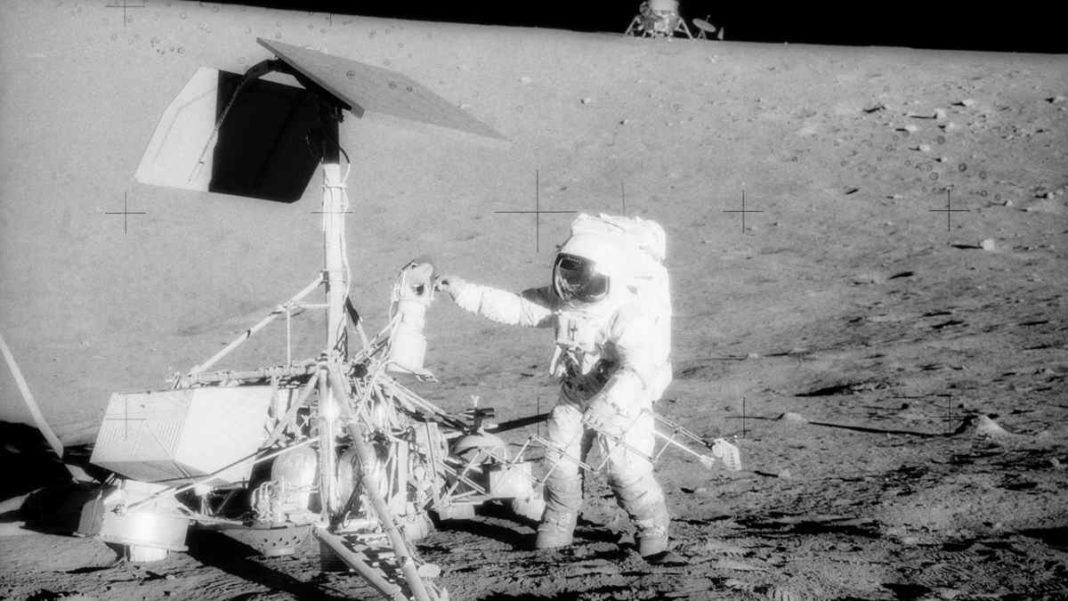UNITED STATES: In a new revelation, a NASA scientist has put forth a compelling argument suggesting that microbial life may indeed exist on the Moon. Prabal Saxena, a planetary scientist at NASA’s Goddard Space Flight Centre, has ignited fervour among scientists and space enthusiasts alike by proposing that certain resilient microorganisms could survive the harsh lunar conditions.
This startling hypothesis challenges the conventional perception of the moon as a desolate and lifeless celestial body.
New horizons at the Lunar South Pole
Saxena’s attention has been drawn to the lunar south pole, an area that has recently garnered significant interest due to NASA’s ambitious plans for the Artemis III mission.
Scheduled to land astronauts there by 2025, this mission aims to unlock the mysteries of the moon’s south pole, which remains unexplored by humans to date.
The lunar south pole is home to craters that harbour ice, potentially serving as a vital resource for future space exploration and colonisation endeavours.
The surprising microbial resilience
Despite the harsh environment, Saxena’s research indicates that certain microbial life forms may be able to survive on the moon. His findings are bolstered by studies demonstrating the remarkable resilience of microorganisms exposed to extreme conditions similar to those found on parts of the lunar surface.
Notable examples include the bacterium Deinococcus radiodurans, which survived on the exterior of the International Space Station for a year, and the renowned tardigrades that have shown remarkable endurance in space.
Earth as the source
A particularly intriguing aspect of Saxena’s hypothesis is the suggestion that any lunar microbial life likely originated on Earth. It is postulated that these microorganisms hitched a ride to the moon on lunar landers, inadvertently being transported by human activities.
If true, this would not only provide evidence of life’s ability to adapt and endure in the harshest of environments but also raise profound questions about the potential for interplanetary panspermia.
Exploring the lunar microbial niche
The next phase of Saxena’s research focuses on identifying the specific organisms most likely to survive and thrive in the lunar niches.
By understanding microbial resilience and adaptation mechanisms, scientists hope to gain insights into the potential for life on other celestial bodies within our solar system and beyond.
This research could have profound implications for future lunar missions, colonisation plans, and our understanding of the origin and distribution of life in the universe.
Implications for the future
If microbial life does exist on the moon, the implications are significant. The presence of life, even in its simplest forms, would challenge our understanding of habitability and the potential for life in seemingly inhospitable environments.
Moreover, the prospect of human colonisation and long-term habitation on the Moon would necessitate a thorough understanding of any potential interactions and impacts between Earth’s and the Moon’s ecosystems.
Conclusion
Prabal Saxena’s groundbreaking hypothesis has ignited a paradigm shift in lunar exploration, compelling scientists to reconsider the Moon’s status as a barren and lifeless celestial body.
His research opens the door to new avenues of inquiry and underscores the resilience of life on Earth and its potential to survive and thrive in extreme environments.
As humanity prepares to venture back to the moon, we may soon unravel the mysteries of lunar microbial life and gain invaluable insights into our place in the universe.
Also Read: NASA-JPL Psyche Mission on Track for Successful Launch Following Outstanding Progress



